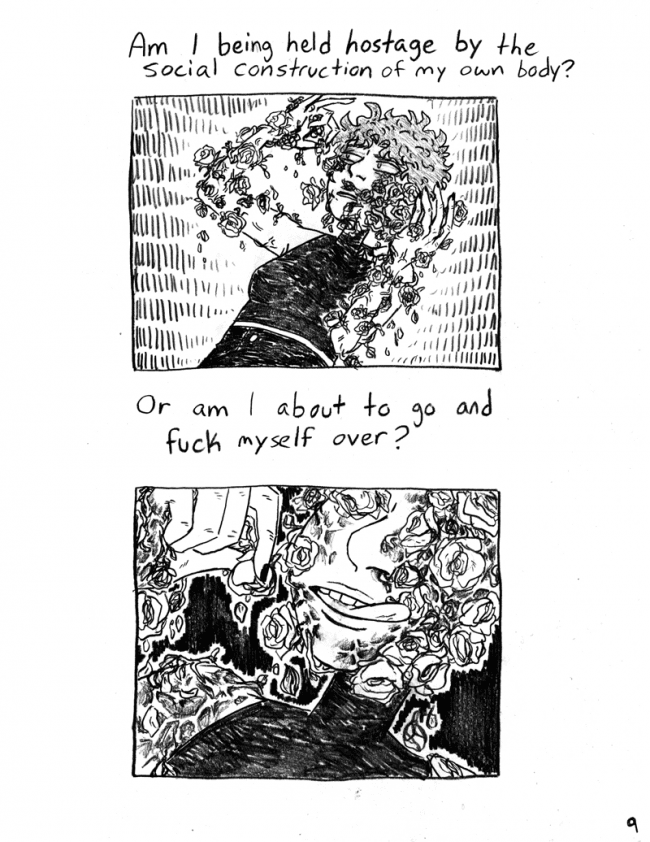As a trans woman, I’m always on the lookout for good trans comics. The field is smaller than you might think, so I’m excited to pick up new work that approaches gender and bodies from a radical perspective. I’m happy to tell you: Tittychop Boobslash is an extremely good, extremely trans comic. It might be the best trans comic I’ve ever read.
Tittychop Boobslash is largely about top surgery (if you're unfamiliar, “top surgery” refers to the removal of breast tissue in order to flatten the chest). Its protagonist, the dangerously depressed Higu, discovers a healthcare loophole through which they can get some or all of the surgery covered by their parents’ insurance without having to go through the normal gatekeeping surrounding trans medical procedures. This is huge — without insurance a person seeking top surgery would have to pay somewhere in the range of ten thousand dollars out of pocket. After a painfully dehumanizing consultation with their surgeon, they set a date for the procedure. The book follows Higu’s progress through the actual surgery, and focuses especially on their inner conflict and frustration as the process unfolds.
Talk to a trans person about their body and you’re likely to run up against a kind of apathetic nihilism. The experience of dysphoria and having to live inside a painful body often gives birth to a kind of carelessness when it comes to self-perception. The cover of Tittychop Boobslash is a drawing of Higu, post-surgery, superimposed over a very visceral color photograph of supermarket ground beef. This isn’t punk for punk’s sake; this is real. Rose writes, “My surgeon’s impersonal, professional hands helped me realize the truth: They were just slabs of meat. So I cut ‘em off.” While the specifics of Rose’s experiences are different from mine, that feeling of alienation from one’s body comes across crystal clear: that’s the experience of being a trans person experiencing dysphoria.
The book is full of short, funny vignettes and personal epiphanies. In what might my favorite sequence, Rose dedicates a full two-page spread to a pornographic yaoi montage as their character tries to get their mind off of things. Suddenly, they have a realization: “I don’t want a chest flatter than the Kansas countryside. Gimme a pair of supple yaoi tits.” It’s hilarious and also very poignant; affirming realizations about trans bodies are relatively unusual, and trans people know: we’ll take them wherever we can find them.
Rose’s drawing is worth special mention. Their scratchy graphite lines and careful pencil tones are filled with pent-up emotion that constantly seems ready to explode out of the page. Rose’s compositions are interesting and carefree, without being held down by precise or overwrought design. They regularly use very smart pacing tricks to give certain segments extra emotional impact, and the dialogue is funny, raw, and genuine. This is a comic by someone who knows how to make good comics.
Although this book isn’t framed as an educational comic, it is an excellent resource for any young trans person navigating the healthcare system. Understanding how other people manage against the same kinds of obstacles can be lifesaving, and Rose’s clear, personal account is full of helpful details. Trans or not, you owe it to yourself to read this book.









